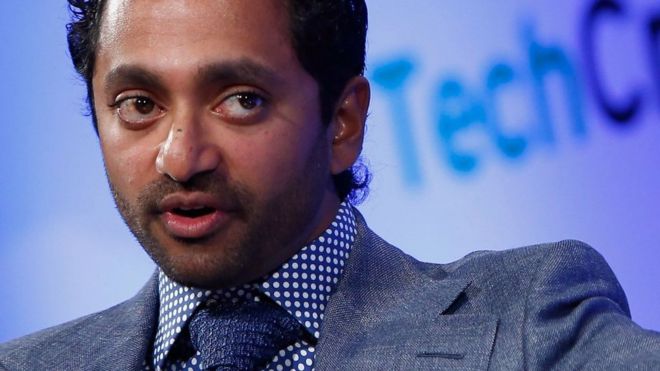Facebook hits back at former executive Chamath Palihapitiya

Facebook has responded to a former executive who said the social network, and other services like it, was “ripping society apart”.
Chamath Palihapitiya made the comments last month but were circulated widely online on Monday.
Facebook took the unusual step of issuing a statement to defend itself.
A spokesperson said Mr Palihapitiya had not worked at Facebook for more than six years.
“When Chamath was at Facebook we were focused on building new social media experiences and growing Facebook around the world. Facebook was a very different company back then and as we have grown we have realised how our responsibilities have grown too.”
- ‘You are being programmed’
- Facebook: Now for children too
- Jeremy Hunt hits out at Messenger for Kids
Mr Palihapitiya, who was Facebook’s vice-president for user growth, is now a prominent venture capitalist.
He is the latest member of an influential chorus worried about the true impact of the “like” culture – a feeling that too many people turn to social networks for validation and happiness.
“We have created tools that are ripping apart the social fabric of how society works,” Mr Palihapitiya said.
He is not alone. Sean Parker, Facebook’s first president and the architect of much of its early commercial development, recently expressed regret about the part he played in Facebook’s history.
“God only knows what it’s doing to our children’s brains,” he told Mike Allen from US news site Axios.
“We take our role very seriously and we are working hard to improve,” Facebook’s statement continued.
“We’ve done a lot of work and research with outside experts and academics to understand the effects of our service on well-being, and we’re using it to inform our product development.
“We are also making significant investments more in people, technology and processes, and – as Mark Zuckerberg said on the last earnings call – we are willing to reduce our profitability to make sure the right investments are made.”
Despite these prominent figures voicing their concerns, Facebook’s business strategy is pressing ahead.
Last week it launched Messenger Kids, its first app for children under the age of 13, a group previously not officially allowed on Facebook (though many often worked around the trivial measures preventing them from signing up).
The launch of Messenger Kids came with the cautious blessing of several organisations that aim to protect children online and elsewhere.
However, UK health secretary Jeremy Hunt tweeted in response: “Stay away from my kids please Facebook and act responsibly.”
Facebook’s statement suggests the company may be devising a strategy to hit back against criticism as we enter 2018. The new year is set to bring many challenges for the firm as it also contends with the persistent issue of fake news and propaganda on the platform.
I predict we’ll see a worldwide marketing campaign highlighting the good Facebook does in bringing communities together. The company’s aim must be to demonstrate that the positive contribution to society will be seen to greatly outweigh the negative.
Source:BBC.com



